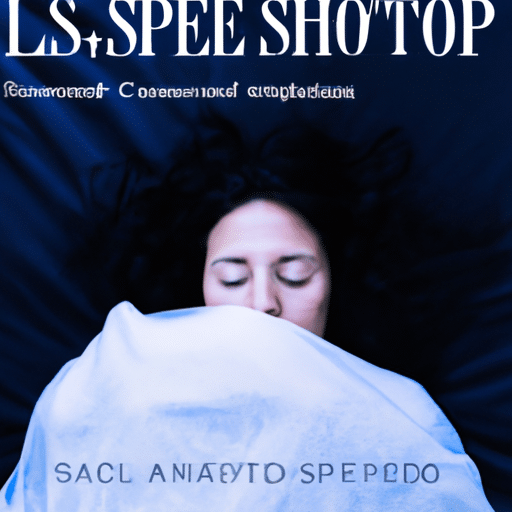Sleep plays a vital role in supporting our immune system’s function, and understanding this connection is crucial for maintaining our overall well-being. In this article, we explore the fascinating relationship between our sleep patterns and the effectiveness of our immune system, shedding light on how getting sufficient rest can enhance our body’s ability to defend against illnesses and infections. Dive into the science behind this intricate connection as we uncover the importance of prioritizing sleep for a healthier and more resilient immune system.
Review contents
The Importance of Sleep
Sleep plays a crucial role in maintaining our overall health and well-being. It allows our bodies to rest, restore, and rejuvenate, ensuring that we can function optimally the next day. While we sleep, numerous processes take place in our bodies, including vital repairs and the strengthening of our immune system.
Sleep and overall health
A good night’s sleep is essential for our physical and mental health. Sleep deprivation can have significant impacts on our overall well-being, leading to decreased cognitive function, impaired mood, and even a higher risk of chronic health conditions such as obesity, diabetes, and heart disease. This is why it is crucial to prioritize quality sleep as part of our daily routine.
The role of sleep in immune system function
The immune system is our body’s natural defense against harmful pathogens such as bacteria, viruses, and parasites. It is responsible for identifying and neutralizing these invaders to keep us healthy. Sleep plays a crucial role in supporting the optimal functioning of our immune system.
Overview of the immune system
The immune system is a complex network of cells, tissues, and organs that work together to defend our bodies against infectious agents. It consists of two main components: the innate immune system and the adaptive immune system. The innate immune system acts as the first line of defense, providing an immediate response to pathogens. The adaptive immune system comes into play when the innate system is unable to fully eliminate the threat. It develops specific responses to target and neutralize the pathogen.
How the immune system works
When our bodies encounter pathogens, immune cells called lymphocytes and phagocytes are activated. These cells identify the foreign invaders and initiate an immune response. Lymphocytes play a critical role in recognizing and eliminating pathogens, while phagocytes engulf and destroy the invaders. These processes are essential in maintaining our body’s health and protecting us from infections.
Sleep Deprivation and Its Effects on the Immune System
Lack of sleep can have detrimental effects on our immune system’s ability to function optimally, leaving us more vulnerable to infections and illnesses. Studies have shown that even short-term sleep deprivation can lead to a decrease in the production of immune cells, making us more susceptible to getting sick.
The impact of sleep deprivation on immune response
Sleep deprivation can weaken our immune response, making it harder for our bodies to fight off pathogens. Research has shown that individuals who consistently lack sleep or have poor-quality sleep are more likely to experience a reduced immune response. This can result in taking longer to recover from illnesses and an increased risk of developing chronic conditions.
Inflammatory response and sleep loss
Sleep deprivation can also contribute to chronic inflammation in the body. Inflammation is a natural response our bodies have to injury or infection. However, when inflammation becomes chronic, it can lead to a range of health issues, including cardiovascular disease, diabetes, and autoimmune disorders. Lack of quality sleep has been shown to increase markers of inflammation in the body, further highlighting its impact on our immune system.
Increased susceptibility to infections
Research has consistently shown that individuals who do not get enough sleep are at a higher risk of contracting common infections, such as the cold or flu. Sleep deprivation weakens our immune system’s ability to fight off pathogens, making it easier for viruses and bacteria to invade our bodies. This not only increases our likelihood of getting sick but also prolongs the duration of our illnesses.
Sleep and Immune Response
Sleep plays a crucial role in regulating our immune response. When we sleep, our body produces and releases various substances, such as cytokines, that help regulate immune cell activity and promote immune system function.
The relationship between sleep and immune response
A well-rested body has a stronger immune response. Sleep allows our immune system to produce and release the necessary biochemical signals to activate immune cells and initiate a robust defense against pathogens. When we lack sleep, these signals may be impaired, leading to a weakened immune response.
Cytokines and sleep
Cytokines are small proteins that play a vital role in regulating inflammation, cell communication, and immune cell activity. During sleep, our bodies produce and release cytokines, helping coordinate immune responses and maintain immune system balance. Sleep deprivation can disrupt this delicate balance, leading to impaired immune cell activity and a greater risk of inflammation.
Sleep’s effect on antibody production
Antibodies are proteins produced by our immune system to help identify and neutralize pathogens. Sleep plays a crucial role in the production of antibodies, ensuring that our bodies have enough to effectively fight off infections. When we do not get enough sleep, our bodies may produce fewer antibodies, leaving us at a higher risk of getting sick and making it harder for us to recover.
Sleep and Inflammation
Inflammation in the body is closely linked to sleep disruptions. Chronic inflammation can arise from various factors, including poor sleep quality, and can contribute to the development of numerous diseases.
Inflammation and sleep disruptions
Sleep disturbances, such as insomnia or sleep apnea, can lead to increased inflammation in the body. When we do not get enough quality sleep, our bodies release inflammatory markers that can trigger and sustain chronic inflammation. This chronic inflammation can lead to a range of health issues, including cardiovascular disease, diabetes, and autoimmune disorders.
Chronic inflammation and its impact on sleep
On the other hand, chronic inflammation can also disrupt our sleep patterns. Inflammatory conditions, such as arthritis or allergies, can cause pain, discomfort, and difficulty breathing, making it challenging to achieve restful sleep. This creates a vicious cycle, as poor sleep further exacerbates inflammation, leading to a continuous detrimental impact on our immune system.
The link between sleep and inflammatory diseases
Chronic lack of sleep has been linked to an increased risk of developing inflammatory diseases, such as rheumatoid arthritis, asthma, and inflammatory bowel disease. These conditions are characterized by excessive inflammation in the body. Sleep disruptions can contribute to the development and progression of these diseases, highlighting the importance of quality sleep in maintaining a healthy immune system.
The Circadian Rhythm and Immune Function
Our bodies’ internal clock, known as the circadian rhythm, plays a crucial role in regulating various physiological processes, including immune system function. Disruptions to our circadian rhythm can have profound effects on our immune health.
The role of circadian rhythm in immune system regulation
The circadian rhythm helps coordinate the timing of our immune responses. It regulates when certain immune cells are most active, enhancing their ability to fight off infections. Disruptions to our circadian rhythm, such as shift work or jet lag, can throw off this coordination, leading to an impaired immune response and greater vulnerability to illnesses.
Melatonin and its influence on immune function
Melatonin is a hormone that plays a vital role in regulating our sleep-wake cycle and maintaining our circadian rhythm. It is also involved in modulating immune system activity. Melatonin helps regulate immune cell functions and has antioxidant and anti-inflammatory properties. By supporting the production and release of melatonin, we can promote optimal immune function and maintain a healthy immune system.
Sleep and Vaccination
Sleep can also influence the effectiveness of vaccinations and our body’s ability to develop a robust immune response.
The effect of sleep on vaccine efficacy
Getting a good night’s sleep before receiving a vaccine can enhance its effectiveness. Sleep helps prime our immune system, ensuring that it is ready to mount a strong response to the vaccine. Inadequate sleep can weaken the immune response following vaccination, potentially reducing its effectiveness in providing protection.
Sleep’s impact on immunization responses
Sleep is essential for optimizing the body’s immune response to vaccines. Research has shown that individuals who get sufficient sleep after receiving a vaccine tend to develop a stronger and more durable immune response. This highlights the importance of prioritizing sleep, especially when undergoing immunization, to maximize the benefits of vaccination.
Sleep Disorders and the Immune System
Sleep disorders, such as insomnia and sleep apnea, can have profound effects on our immune system’s ability to function optimally.
Insomnia and its effect on immune health
Insomnia, characterized by difficulty falling asleep or staying asleep, can lead to various health issues, including immune dysfunction. Chronic insomnia can disrupt the body’s regulation of immune cell activity, impair the production of antibodies, and interfere with the release of key immune signaling molecules. This can leave individuals more susceptible to infections and less able to mount an effective immune response.
Sleep apnea and immune dysfunction
Sleep apnea, a disorder characterized by intermittent pauses in breathing during sleep, can also negatively impact immune function. It can lead to chronic sleep deprivation and recurring disruptions of sleep, affecting the production of immune cells and inflammatory markers. This can contribute to an increased risk of infections and the development of chronic inflammatory conditions.
Tips for a Good Night’s Sleep
To ensure we get enough sleep and support our immune system, here are some tips for achieving a good night’s sleep:
Establishing a regular sleep schedule
Go to bed and wake up at the same time every day, even on weekends. This helps regulate our circadian rhythm, making it easier to fall asleep and wake up feeling refreshed.
Creating a comfortable sleep environment
Ensure your bedroom is dark, quiet, and at a comfortable temperature. Use blackout curtains, earplugs, or a white noise machine to enhance the quality of your sleep environment.
Practicing relaxation techniques before bed
Engage in activities that help you relax before bedtime, such as reading a book, taking a warm bath, or practicing deep breathing exercises. Avoid stimulating activities, such as using electronic devices or consuming caffeine, close to bedtime.
Conclusion
Sleep plays a vital role in supporting our immune system’s ability to function optimally. It is essential for maintaining overall health, promoting a robust immune response, and reducing the risk of infections and chronic inflammatory conditions. By prioritizing and improving the quality of our sleep, we can ensure that our bodies have the necessary resources to defend against pathogens and achieve optimal immune system function. So, let’s value our sleep and make it a priority in our daily lives for the sake of our health and well-being.



























